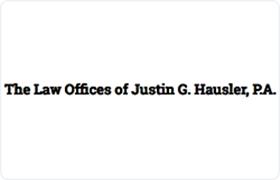Maitland RICO Act Lawyer, Florida
Sponsored Law Firm
-
 x
x

Click For More Info:
-
The Law Offices of Justin G. Hausler, P.A.
5570 South US Highway 17-92 Casselberry, FL 32707» view mapCriminal Defense Because Your Case Matters
As a Former Prosecutor, Justin G. Hausler has a wealth of jury trial experience and offers representation regarding all misdemeanor and felony charges.
407-617-1064
Not enough matches for Maitland RICO Act lawyer.
Below are all Maitland Criminal lawyers.
Justin G. Hausler
✓ VERIFIEDJustin G. Hausler has worked in the criminal area of practice since being admitted to the Florida Bar. He began his legal career as a Prosecutor for t... (more)
Tanya White
✓ VERIFIEDHello, I’m Tanya White. Standing Up for You and Your Rights Having a legal issue is generally an unpleasant experience. It may mean that you have... (more)
Iyada Evette Jackson
✓ VERIFIEDIyada Jackson is an accident lawyer proudly serving Altamonte Springs, Florida and the neighboring communities.
Timothy Wayne Terry
✓ VERIFIEDFor more than 25 years, the office of Timothy W. Terry, Attorney at Law has provided one-on-one attention to people in Orlando and throughout central ... (more)
Kirk N. Kirkconnell
Victoria Lyn Anderson
FREE CONSULTATION
CONTACTFREE CONSULTATION
CONTACT Justin Hausler Casselberry, FL
Justin Hausler Casselberry, FL AboutThe Law Offices of Justin G. Hausler, P.A.
AboutThe Law Offices of Justin G. Hausler, P.A. Practice AreasExpertise
Practice AreasExpertise






